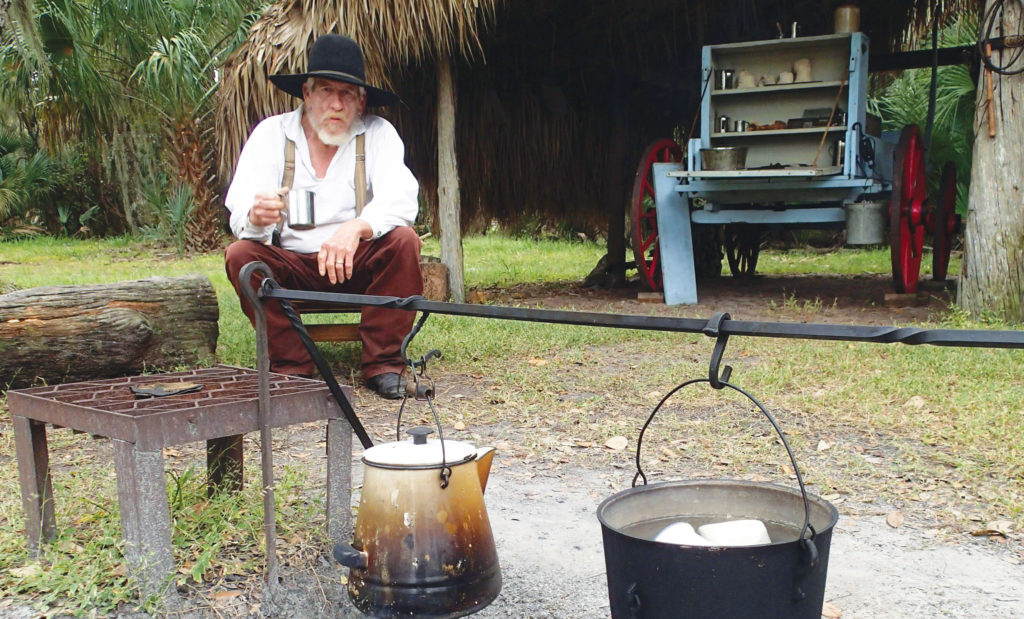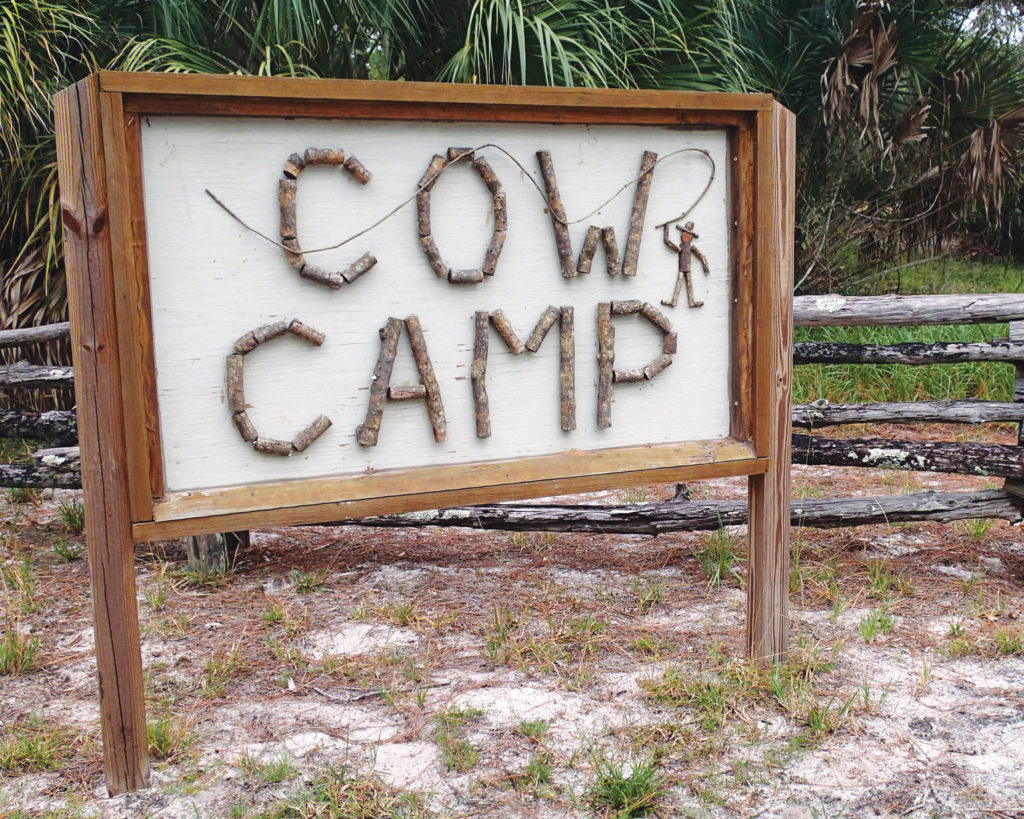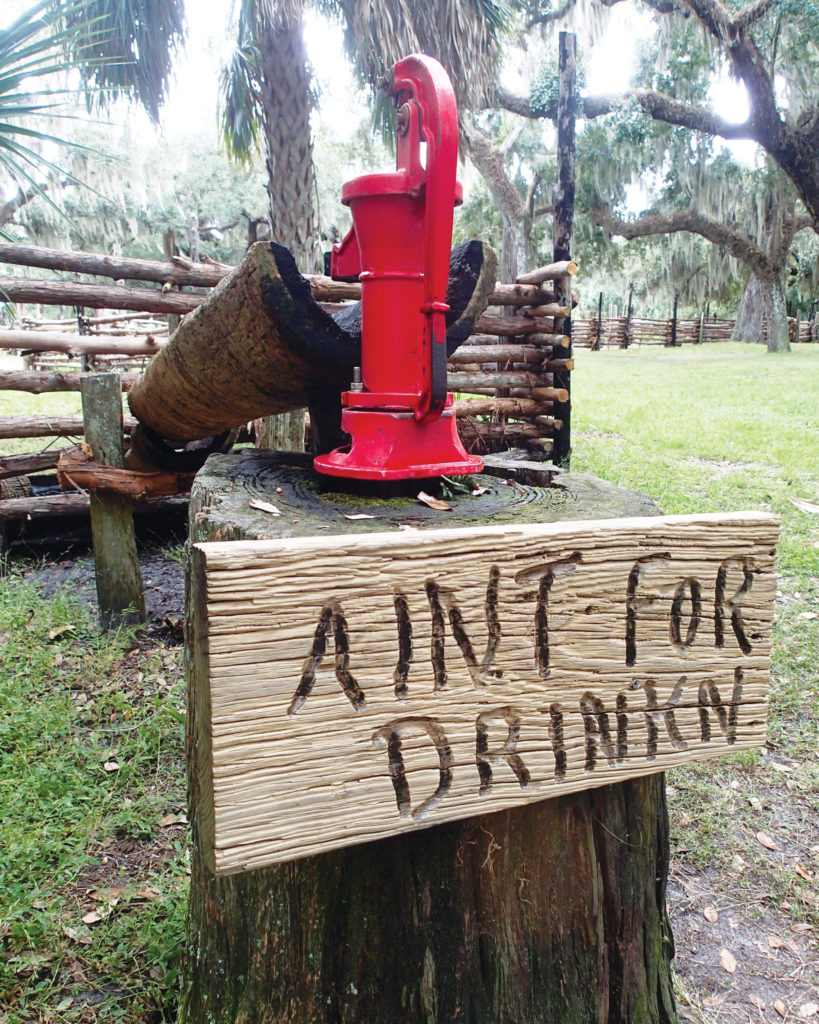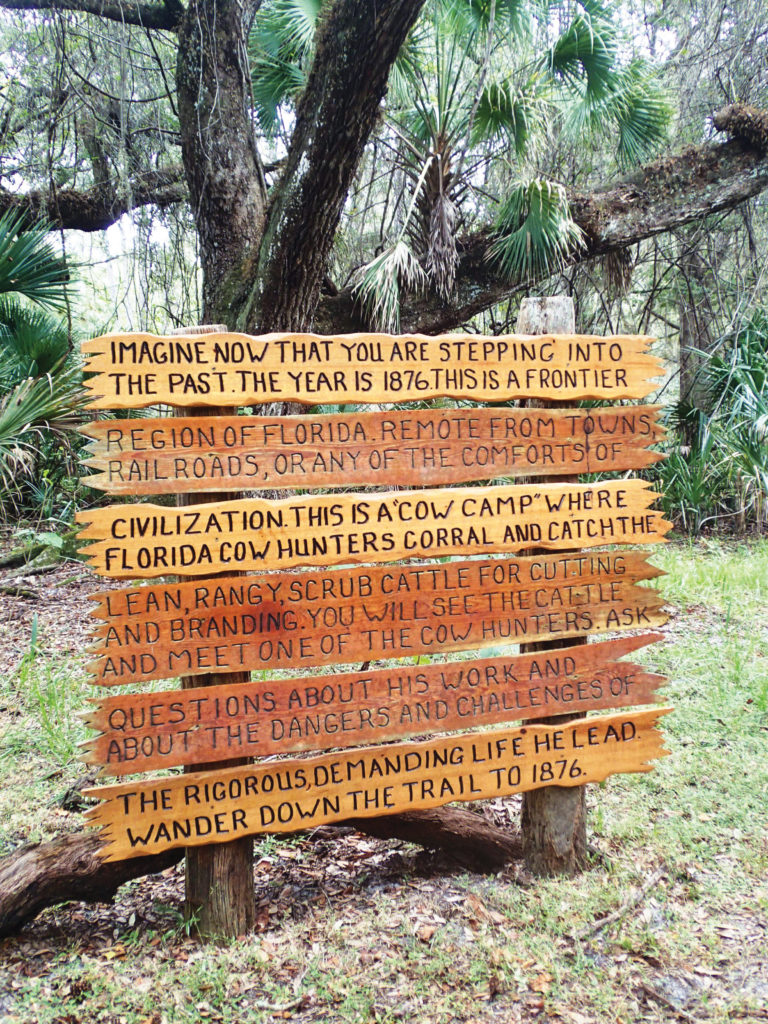Cow CampThe Life Of A Cracker Cow Hunter
By James Coulter
Step back into time at Lake Kissimmee State Park’s Cow Camp and see life through the eyes of a cracker cow hunter.
Time traveling from the 21st century and back into the 19th century is closer than you think—roughly an hours drive or so, depending where you are in Polk County. It’s called Cow Camp and it’s a step back in time to a simpler, yet harder life.

Located off State Road 60, 15 miles east of Lake Wales, is Lake Kissimmee State Park. Ride three miles into the park and you’ll see a sign that reads “Cow Camp.” Turn down that dirt road and you’ll reach a forest clearing with a wooden gateway. Passing through that gate by foot is when you’ll magically step back into the 19th century.
Less than a minute’s walk along that rugged forest trail will take you upon another sign. It informs you that you have stepped into another time. The year is 1876. You’re now in the middle of untamed Florida wilderness. “This is a frontier region of Florida, remote from towns, railroads, or any of the comforts of civilization,” the sign reads.

Eventually, after a few more minutes of meandering through the silent forest, occasionally interrupted by the sound of your own footsteps and the rustling of the trees within the breeze, you come across an encampment within an oak hammock. There you hear the lowing of cattle, the crackling of a campfire, and perhaps even the cracking of a whip.
You come across a chickee hut with a wooden floor and a cabbage palm leaf roof. A grizzled old man dressed in weathered leather clothes steps out from the makeshift shelter steps. Outside of the camp, he is a forest ranger named Mark Korushak—but in this camp, he’s a cow hunter who goes by the name of Grazer.
Grazer is a cow hunter. He works for one of 32 major cattle owners in Florida. Most of the cattle in the Kissimmee Valley is owned by Jacob Summerlin, known as the “Cracker King of Florida.” Grazer looks after his cattle for a dollar a day. That may be meager pay today, but back then, they were really good wages—equal to nearly $100 a day in today’s money!
His job is simple: watch over the cows to make sure nobody steals or messes with them. As Florida is an open-range state, all he needs to do is open the gates to let them loose and graze. Afterward, he rustles them back into their pen for the evening.
Most cow hunters like him learn at the young age of 6 or 7 when they’re old enough to pop a whip. At age 12 or 13, they’re old enough to go on their first cattle drive. Grazer has been on plenty of drives in the past. Now that he is much older, he prefers the quieter life of watching the cows in the pasture.

He resides within a makeshift hut called a chickee. The roof is made of nearly 2,000 cabbage palm leaves. They can last for a good three to five years before being patched again. The hut has no walls. This makes it easier for him to keep an eye on the cattle. It also allows for an open breeze to pass through.
“It is cooler in there than out here in the summertime,” Grazer says.
The only downside to his open shelter are the mosquitos. They can get pretty bad during the summer. Fortunately, the smoke from his campfire helps keep them away. If they become especially bothersome, he finds himself a cow patty and tosses it on the fire. It may smell bad, but the mosquitos hate the smell even more so.
“You put two to three cow patties on the fire, then no mosquitos are going to bother me none,” he says.
Grazer cooks all of his food on an open campfire. His boss supplies him with most of his rations: beans, rice, grits, and coffee—the latter of which he drinks a lot of. Sometimes, while on the trail, he’ll hunt for a boar or deer. He has to eat what he catches. The meat only lasts a day or two out in the elements otherwise.

Rarely does he need to ride into town. The closest city is Bartow. Lake Wales won’t be founded for another 35 years. When he does visit, he leaves on his Cracker pony first thing in the morning and arrives in town come sundown. There he visits the saloon for a few drinks before finding a room at the inn and heading back to camp in the morning.
Living far from civilization cuts him off from news of the outside world. The most he knows is that the president is Ulysses S. Grant—or as he calls him, “Useless Grant.” Why does he call him “Useless”?
“He is a politician,” he replies. “That ought to do it right there. Can’t trust those politicians…Maybe one of these days, things will change.”
His biggest challenges are wolves and rattlesnakes. If a wolf goes after a sick, old cow, that’s not too big of a problem. An entire pack of wolves attacking 25 to 30 head of cattle? That’s a bigger problem. Fortunately, his cows will alert him if anything is in the area. He’ll grab his gun and see what the matter is. Though he needs to use his gun sparingly. Black powder is expensive and hard to come by.
Otherwise, Grazer prefers the solitude of living and working in the middle of nowhere. He much prefers it to the hustle and bustle of the town. Sometimes he happens across a passing stranger from another time curious about his work, and he’s more than happy to answer their questions.
The Cow Camp is located within Lake Kissimmee State Park, located at 14248 Camp Mack Rd, Lake Wales, FL 33898. The camp is open 9:30 a.m. to 4:30 p.m. every Saturday, Sunday and holidays (except Christmas) from October 1 through May 1. Admission to the camp is free, and park admission is $5 per person. For more info visit: https://www.floridastateparks.org/parks-and-trails/lake-kissimmee-state-park.
